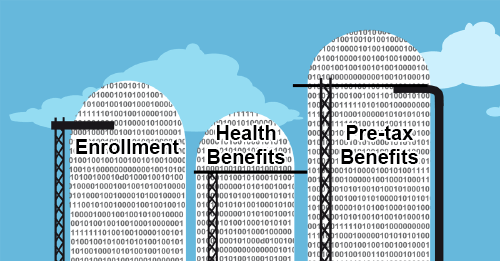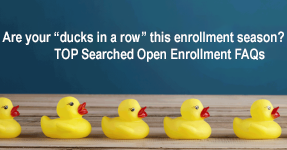Most employees look forward to enrolling in benefits about as much as a cat looks forward to taking a bath.
I was talking to a friend recently who said her boyfriend received his Open Enrollment materials in the mail… and promptly threw them on the table unopened.
According to the 2017 Benefits Communication Survey from Jellyvision, almost half of employees report enrolling in benefits as “always very stressful”. That’s scary.
What makes enrolling in benefits stressful?
There are multiple reasons: not feeling informed about nuances, regrets about the decision made, and not enough time to make a selection.
When it comes to pre-tax benefits specifically, we found three areas that are common culprits:
- Gaps in understanding of pre-tax benefits
- Overly complicated benefits material
- Minimal integration of pre-tax benefits
Gaps in understanding of pre-tax benefits
The BRight Ideas Quiz administered by Benefit Resource in 2017 revealed several key areas within pre-tax benefits where participant understanding needs improvement. In this section, we’ll explore areas related to Flexible Spending Accounts, Health Savings Accounts, and Health Reimbursement Accounts.
- Approximately 1 out of 3 participants fail to understand that separate enrollments and elections are required for a Medical FSA and Dependent Care FSA (DCA)
- 50% of participants incorrectly think HSA funds are treated like FSA funds and are forfeited at the end of the plan year instead of automatically rolling over from year to year
- Of employees with an HRA, just over one third (34%) incorrectly believe they can make deposits into the account, despite the fact that employers are the sole contributors to the account
How to counteract it: For FSAs, HSAs and HRAs
For FSAs: In communications and at benefit meetings, give the two accounts distinct, descriptive names. The Medical FSA can be a General FSA or Med FSA while the DCA can be referred to as a “Child Care Account”.
For HSAs and HRAs: Start enrollment meetings by having employees play “Two Truths and a Lie“. You can create multiple versions of the game based on your employees’ primary misunderstandings about pre-tax benefits.
Overly complicated materials
Many employees are looking for a reason to pass over their enrollment materials (or procrastinate until the very last minute). Providing overly complicated materials starts the whole process of enrolling in benefits off on the wrong foot. It can result in employees tuning out early or feeling discouraged when they try to read the materials.
How to counteract it: Simplify
Too many healthcare choices can easily bog down employees. This is probably the largest offender within enrollment materials. Employees often don’t make it past the first hurdle of reviewing and understanding health plan options. While it sounds counter intuitive, fewer options is often better.
When you give employees one or two health plan options, you can spend more time expanding on:
- how employees can become better healthcare consumers
- best practices for funding pre-tax accounts alongside a health plan
- wellness opportunities accessible through the various health plans
Lack of pre-tax benefits integration
Too often, pre-tax benefits are addressed as a separate topic from company’s health plan benefits offerings. However, the two actually go hand-in-hand.
 Pre-tax benefits complement and strengthen the existing health plans available. To divorce the topics does a disservice to the benefits package you’ve worked to curate.
Pre-tax benefits complement and strengthen the existing health plans available. To divorce the topics does a disservice to the benefits package you’ve worked to curate.
How to counteract it: Ditch the silo approach
Integrating pre-tax benefits into the overall benefits discussion provides two direct benefits:
1) Reduces employees’ stress levels by improving their understanding of what is offered and how it helps them
2) Increases your savings through payroll deductions because more employees are willing to enroll in pre-tax benefits
So spread your benefits umbrella a little wider to include pre-tax benefits this year.
What you can do right now
The strategies outlined above are a combination of short-term and long-term strategies for Open Enrollment.
In addition to the above tips, here are three actions you can apply today:
- Set up extra time on the calendar to talk to employees with questions. Check out our blog 3 Tips for Employers to Better Communicate the Advantages of Pre-tax Employee Benefits for some fresh ideas.
- Download and share these one-pagers on “Why Should I Enroll” with employees. The files are available for current clients on BRiWeb and can be found on our Enrollment Overview Planning Page in the Communication section.
- Remind employees of Open Enrollment resources from Benefit Resource like these:
| Top Searched Open Enrollment FAQs | |
Good luck with Open Enrollment!








